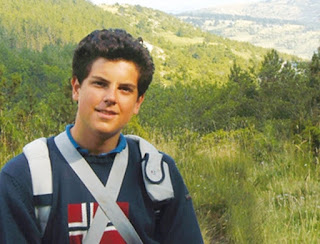Today is the feast of Pope St. John Paul the Great. When you read in the "ordo" about the saint of the day, there is often 2 or 3 sentences about the person; if they were more significant or there is more known about them there might be a couple more sentences; it isn't, after all, intended to be a biography: However, when it is a true giant amongst the faithful there can be a lengthier paragraph, such as for Pope St. Gregory the Great, St. Augustine, and Pope St. John Paul the Great.
Many of those over the age of 50 will remember him, and those over the age of 60 probably remember something about him. He reigned for 26 years, from October 16, 1978 to April 2, 2005. He passed over into eternal life after first vespers of the feast he confirmed for the universal Church - The Feast of Divine Mercy.
The times in which he served as bishop, Archbishop of Krakow, and then pope were times of great upheaval. In the wake of the Second Vatican Council, in which he participated and to which he contributed in a significant way, the social upheaval of the 1960's threw everything into chaos, especially in the west. He came to the Chair of Peter recognizing that the work of the Council had barely begun and set about helping the Church and the world understand the teachings of that Council and what they meant for the the life and mission of the Church in the contemporary world.A short catalog of the gifts he left the Church includes: the Catechism of the Catholic Church, the new Code of Canon Law for both western and eastern Churches, the third edition of the Roman Missal, 14 Encyclicals, 15 Apostolic Exhortations (9 of those post-synodal, and 5 in preparation for the Great Jubilee Year- 2000), and innumerable other letters speeches and catechesis. The most memorable, and arguably the most monumental, of these being his catechesis known as the "Theology of the Body". But nothing beat his love for our Blessed Lady, the ever-virgin Mary. Finally, he showed us the dignity of old age and how to die well.
I am personally grateful for our Holy Father's ministry; it was a
significant factor in my hearing God's call to priestly ministry; and it significantly shaped my vision of priesthood and my zeal for souls. May his teaching, example, and prayers for the Church be a sure help for all those seeking to know and serve God and His holy Church, especially our present Holy Father - Pope Francis.
that Saint John Paul the Second
should preside as Pope over your universal Church,
grant, we pray, that instructed by his teaching,
we may open our hearts to the saving grace of Christ,
the sole Redeemer of mankind.
Who lives and reigns with You,











